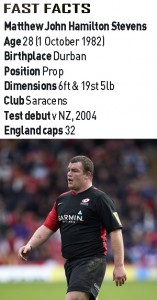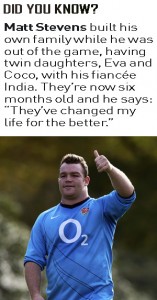For matt stevens, life at Saracens this season started with a chocolate-eating contest and will end, he hopes, with a return to the England set-up for next month’s Churchill Cup. 
The former Bath prop arrived at the London club in January after serving a two-year ban for testing positive for cocaine following a Heineken Cup match against Glasgow in 2008. And after talking to him about his reinvention, it seems that he couldn’t have landed in a better place.
“Any player would want to be at Saracens at the moment,” says Stevens, who can play on both sides of the scrum. “They’re ambitious and promote a hard-working ethos. Rugby, more than any sport, is played by a band of brothers and it’s crucial you’re the sort of person who can take the mickey and have the mickey taken out of you.”
And Stevens has fitted in well, as team-mate Alex Goode explains: “We have many gifted players in our squad but the real currency in our environment is work ethic and intensity, and Matt doesn’t lack either. In his first training session Matt hardly stopped running for an hour, tackling, chasing, offloading, increasing the intensity of the session all on his own, instantly earning everyone’s respect.”
Stevens earned some of that respect with his performance off the pitch on his first day with the club. He was challenged to that aforementioned ‘eat-off’ against James Ellershaw, a big lad himself, and promptly devoured a Mars bar and a bag of chocolates to leave the fellow prop in his wake. He lost his second test, a ‘sing-off’ with Kelly Brown, his version of Bat Out of Hell being trumped by the Scot’s Mustang Sally. But in those cameos he won the hearts of the Saracens players, many of whom must have been sceptical about the mid-season arrival of such a high-profile international player.
In recent seasons, Saracens have started a programme to develop their players off the pitch as well as on it. Technical director Brendan Venter had the players reading a book a month and this season they have made trips – as a squad – to the Munich Beer Festival and Miami. Stevens certainly appreciates the club’s ethos.
“Getting banned led to where I am today,
and I’m genuinely in a better place.
I’m delighted the public have been so forgiving”
“The way Saracens look after their players away from the match or the training field is crucial and it can be vital when you’re under the cosh,” says the 28-year-old. “The culture is focused on creating happy, fulfilled people off the field. Bear in mind that you’re asking
a group of guys to go into a physical contact sport, and to do that well you need a particularly strong mind. Everything you do off the field – how a guy’s family is doing, how he’s doing in his personal life – all add up to how you perform on the field.”
“Saracens is a great club to be at. The extra work they do with psychologists or with placing players with businesses in the City
of London and the speakers they bring in to talk to the guys is creating renaissance individuals. Time will tell if it works on the field.
“My feeling is that the owners, the board, the chief executive Edward Griffiths and the coaches want us to win, but they want us to win in the Saracens way. That means living life properly, and having a happy life.
“With five minutes to go when the result is on the line, where does a player get his motivation from? It’s not from money but from the bond you have with your team-mates. It’s not just about winning – it has to be about something bigger than that. We all feel we’re a big extended family, but we also know this family honestly cares about all our own personal families. We put it on the line for that.”
 No one ever suggested that Stevens was trying to gain an advantage by taking a recreational drug and he was therefore, although he’ll never say it, treated shockingly by rugby’s authorities. The RFU are quick to clamp down on players who transgress, but are often slow to offer them the emotional and pastoral help they often need.
No one ever suggested that Stevens was trying to gain an advantage by taking a recreational drug and he was therefore, although he’ll never say it, treated shockingly by rugby’s authorities. The RFU are quick to clamp down on players who transgress, but are often slow to offer them the emotional and pastoral help they often need.
Stevens, who last played for England in June 2008 against New Zealand, could have been forgiven for turning his back on rugby after the way he was cast out, as if he had taken performance-enhancing drugs. But he isn’t that sort of character. His glass is always half-full.
“That whole experience, getting banned, all led to where I am today, and I’m genuinely a lot happier a person and in a better place. Supporters of all teams have also been so supportive. People were coming up to me and saying, ‘It’s great to have you back’. I was very happy to hear that and humbled too. I didn’t expect it but I’m delighted the rugby public have been so polite and forgiving.”
Having hit the ground running with Saracens, a move back into the full England squad is his next target. Stevens’s first big chance to push his claims for a World Cup spot comes next month when the Churchill Cup arrives in England.
England Saxons are grouped with Tonga and the USA, the first game taking place against the Eagles on 4 June. From there, his fate is in his own hands because England’s initial 50-man squad for the World Cup is announced on 17 June.
Stevens has already won the chocolate-eating competition this season, but nothing would taste sweeter than an England recall.
This article appeared in the June 2011 issue of Rugby World Magazine.
Find a newsagent that sells Rugby World in the UK
Or perhaps you’d like a digital version of the magazine delivered direct to your PC, MAC or Ipad? If so click here.
For Back Issues Contact John Denton Services at 01733-385-170 visit






